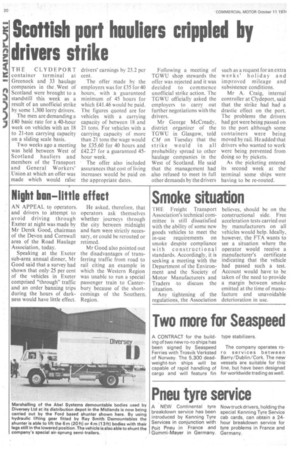Scottish port hauliers crippled by drivers strike
Page 22

If you've noticed an error in this article please click here to report it so we can fix it.
THE CLYDEPORT container terminal at Greenock and 33 haulage companies in the . West of Scotland were brought to a standstill this week as a result of an unofficial strike by some 1,300 lorry drivers.
The men are demanding a £40 basic rate for a 40-hour week on vehicles with an 18 to 21-ton carrying capacity on a sliding scale basis.
Two weeks ago a meeting was held between West of Scotland hauliers and members of the Transport and General Workers' Union at which an offer was made which would raise drivers' earnings by 23.2 per cent.
The offer made by the employers was for £35 for 40 hours, with guaranteed minimum of 45 hours for which £41.46 would be paid. The figures quoted are for vehicles with a carrying capacity of between 18 and 21 tons. For vehicles with a carrying capacity of more than 21 tons the wage would be £35.60 for 40 hours and £42.27 for a guaranteed 45hour week.
' The offer also included assurances that cost of living increases would be paid on the appropriate dates. Following a meeting of TGWU shop stewards the offer was rejected and it was decided • to commence unofficial strike action. The TGWU officially asked the employers to carry out further negotiations with the drivers.
Mr George McCready, district organizer of the TGWU in Glasgow, told CM on Tuesday that the strike would in all probability spread to other haulage companies in the West of Scotland. He said that the management had also refused to meet in full other demands by the drivers
such as a request for an extra weeks' holiday and improved mileage and subsistence conditions.
Mr A. Craig, internal controller at Clydeport, said that the strike had had a drastic effect on the port. The problems the drivers had got were being passed on to the port although some containers were being moved by rail. He added that drivers who wanted to work were being prevented from doing so by pickets.
As the picketing entered its second week at the terminal some ships were having to be re-routed.




























































































































































